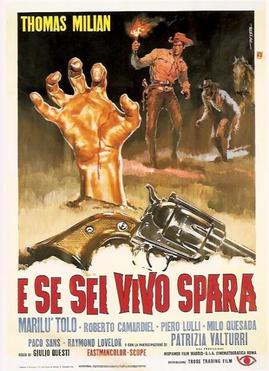Django Kill... If You Live, Shoot!
| Django Kill... If You Live, Shoot! (Se sei vivo spara) |
|
|---|---|

Italian film poster
|
|
| Directed by | Giulio Questi |
| Produced by | Alessandro Jacovoni Giulio Questi |
| Screenplay by | Franco Arcalli Giulio Questi Benedetto Benedetti |
| Story by | Franco Arcalli Giulio Questi María del Carmen Martínez Román |
| Starring | Tomas Milian Marilù Tolo Roberto Camardiel Piero Lulli Milo Quesada Paco Sanz Raymond Lovelock Patrizia Valturri C. Thomas Howell Dermot Mulroney |
| Music by | Ivan Vandor |
| Cinematography | Franco Delli Colli |
| Edited by | Franco Arcalli |
|
Production
company |
GIA Società Cinematografica
Hispamer Films |
| Distributed by | Indipendenti Regionali (Italy) Golden Era Film Distributors (UK) |
|
Release dates
|
3 May 1967 |
|
Running time
|
117 minutes |
| Country | Italy Spain |
| Language | Italian |
Django Kill... If You Live, Shoot! (Italian: Se sei vivo spara , lit. If You Live Shoot), also known as Oro Hondo and simply as Django Kill!, is a 1967 Italian Spaghetti Western film directed and co-written by Giulio Questi.
Despite the fact that it has "Django" in its title (outside of Italy), the movie has nothing to do with the Django movies.[1] It is well known for the surrealistic violence and for the psychedelic editing of Franco "Kim" Arcalli. Phil Hardy defines it as "the most brutally violent spaghetti western ever made".[2] Describing the film, Christopher Frayling says that "the violence was of an extraordinarily savage kind".[3] Antonio Bruschini writes that "this film is the first western to offer a sample of truly horrendous scenes".[4] Marco Giusti defines the film as the most violent and bizarre ever filmed in Italy.[5]
One week after its release, an Italian Court confiscated Django Kill for its scabrous violence. The film was re-released seven days later, with 22 minutes removed.[6] The film had censor problems in many other countries: in England, the British censorship removed about half an hour of film.[7] Recently, several DVD editions restored the removed scenes, publishing the film in an uncut and uncensored version.[6]
Contents
Plot
American and Mexican outlaws rob a US Army gold transport. After the successful ambush the Americans attempt to keep the booty for themselves by planning to execute the Mexicans, though one of their number breaks free and kills several of their horses with a machete. The Mexicans dig their own grave and are shot, however their leader is badly wounded and survives being buried alive. He is rescued by a pair of Indians who treat his wounds in exchange for his addressing their people on what he has seen of the afterlife during the period he was "dead". They also give him golden bullets to use for his revenge. Pursuing the gang that killed his comrades, the Stranger finds shelter among locals but Templer, a saloon owner, Hagerman an Alderman who keeps his wife a prisoner in their home and Sorrow, the leader of a band of black garbed homosexuals hear about the gold and want it for themselves.
Cast
- Tomas Milian as The Stranger
- Marilù Tolo as Lori
- Piero Lulli as Oaks
- Milo Quesada as Bill Templer
- Miguel Serrano as Indian
- Paco Sanz as Hangerman
- Ángel Silva as Indian
- Félix Sancho Gracia as Willy
- Mirella Pamphili as Woman in Town
- Ray Lovelock as Evan Templer
- Roberto Camardiel as Sorrow
- Patrizia Valturri as Elizabeth Hangerman
References
- ↑ Lua error in package.lua at line 80: module 'strict' not found.
- ↑ Lua error in package.lua at line 80: module 'strict' not found.
- ↑ Lua error in package.lua at line 80: module 'strict' not found.
- ↑ Lua error in package.lua at line 80: module 'strict' not found.
- ↑ Lua error in package.lua at line 80: module 'strict' not found.
- ↑ 6.0 6.1 Lua error in package.lua at line 80: module 'strict' not found.
- ↑ Lua error in package.lua at line 80: module 'strict' not found.